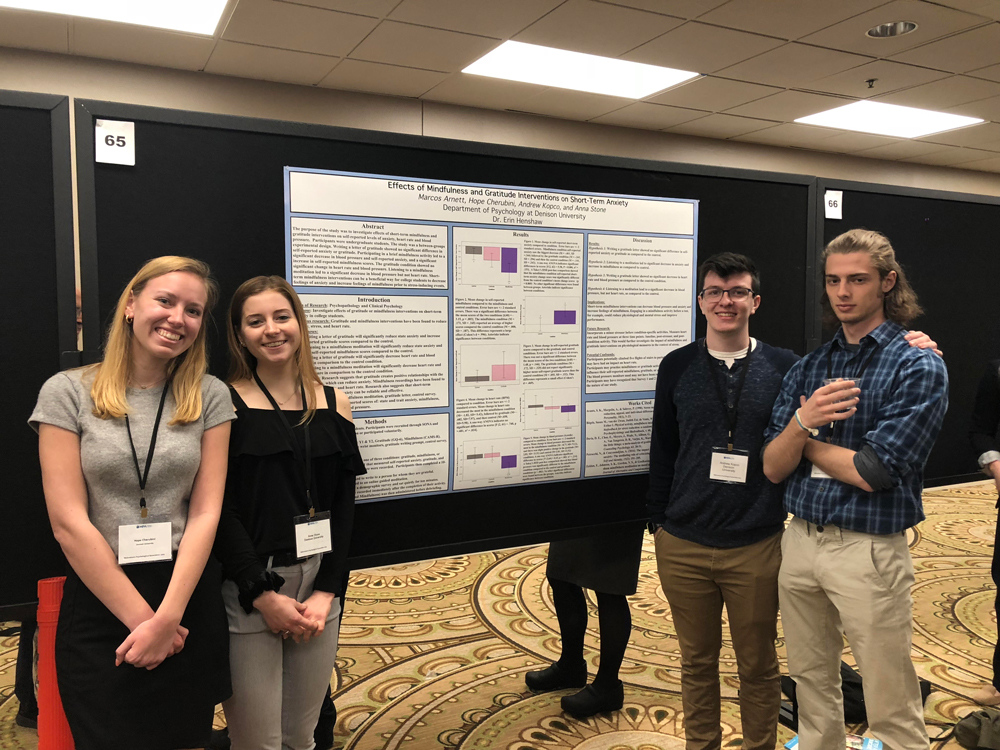Everyone feels stress and anxiety — and that includes college students. So in their Abnormal Psychology course with Associate Professor Erin Henshaw, Marcos Arnett ‘20, Hope Cherubini ‘21, Andrew Kopco ‘20, and Anna Stone ‘21 designed a research experiment to explore the effects of mindfulness and gratitude activities could reduce short-term anxiety.
“We came together as a research group because of our passion for investigating ways to decrease short-term anxiety — especially because of its relevance to the college population,” says Cherubini. “We wanted to conduct research that would have a positive impact on our Denison community.”
The group began by taking baseline readings of blood pressure, heart rate and feelings of mindfulness, gratitude, and anxiety. “Then we randomly assigned participants to one of three conditions: the mindfulness condition, the gratitude condition, or the control group,” says Kopco. In the mindfulness condition, participants listened to a short audio meditation; in the gratitude condition, they wrote a letter to someone they were grateful for; and in the control group, they took a short survey, unrelated to either topic.
After participants completed their assigned task, their blood pressure and heart rates were measured. They also took a survey to gauge their feelings of mindfulness, gratitude, and anxiety.
The results? “We found that students who completed the mindfulness activity had significantly decreased blood pressures, increased self-reported feelings of mindfulness, and decreased self-reported feelings of anxiety at levels we didn’t observe in the control or gratitude groups,” says Stone. The results indicate that mindfulness intervention noticeably decreases anxiety immediately at both a psychological and physiological level.
Cherubini shares that this finding doesn’t surprise them. Students who completed the mindfulness exercise remarked “I feel so relaxed right now!”
Arnett adds, “We found what I already found to be true for myself. Spending time alone, organizing thoughts, remembering what’s important and just breathing is helpful for one’s health. Finding data that supports that makes a lot of sense.”
Henshaw says, “This group of students worked extremely hard on this project. They thought creatively, communicated effectively, and contributed a lot of time and effort to answer their research question.”
“In the end, their results suggest that something as simple as a short, freely available mindfulness audio file could positively impact the students who listen to it…which is exciting!” She adds, “I think anything that makes a noticeable impact on our stress levels in 20 minutes or less is definitely worth learning more about.”
It’s important for students to develop ways to keep their mental health in check, and evidence has shown that mindfulness is a peaceful, autonomous, and effective way to do so.
The students are sharing their results with professionals. They are presenting their research at the Midwest Psychological Association Conference in Chicago.
And the four researchers are taking their work seriously — they are using mindfulness techniques in their own practices. Stone has begun participating in KORU mindfulness classes, offered through Chaplain Phoebe Myhrum. “We meet once a week, learn a new method of mindfulness, practice that technique for ten minutes every day over the course of the week and use an app to track how we’re feeling about it. Last week we learned about breathing techniques.”
Cherubini and Kopco have also turned to technology-based resources. Cherubini has downloaded the Headspace app. Even three-minute exercises are helpful. “I’ve even suggested the app and mindfulness activities to my family and friends as ways to help eliminate stressors that they may be dealing with.”
When up against a big exam the next day, Kopco has begun using guided sleep meditations at night to calm his mind and prepare him for a good night’s rest.
As busy college students themselves, they recognize the practical benefits of meditation and mindfulness rest in the practices low time-commitment, accessibility, and immediate results. A three-minute mindfulness activity before a test, athletic game, or musical or theatre performance can help students feel more calm and less anxious.
“Using an app makes it very accessible. You can practice on your own time, where you want, when you want,” says Stone. “You don’t have to go to 60-minute yoga class. It’s easy and it doesn’t have to be another stressor.”
“It can be beneficial for students to talk with a counselor, but sometimes people don’t want to,” says Kopco. “Mindfulness can be an alternative. If you’re having a stressful day, you can take ten minutes right then in the middle of your day to deal with stress.”
Arnett agrees. “As college students, it can be challenging to navigate the psychological landscape on our own. Activities that are practical and easy to perform in nature that also have reliable outcomes in terms of reducing anxiety are therefore of great benefit to students.”
“Our campus culture can sometimes be geared toward over-involving yourself in things — classes, student organizations, sports, and campus jobs, which makes it feel like there’s not enough time to do everything,” he adds. “We don’t take time to sit down and think, reflect, meditate, call people who are important to us. It is important for students to find and develop their own ways to keep their mental health in check, and past and present evidence has shown that mindfulness interventions are a peaceful, autonomous, and consistently effective way to do so.”
